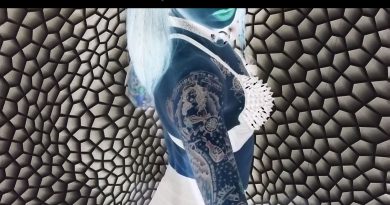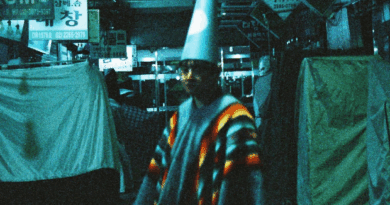A Chat with The Dialtones (28.04.25)
A concoction of kaleidoscopic sound, The Dialtones draws together the skills of Lauren Gurgiolo (guitar), Chris Hausler (drums), Mike St. Clair (bass), Sahara Smith (vocals), and Wiley Green (synths). All notable artists in their own right, they bind various experiences, influences and styles into the US-based band’s moving music. We speak with Lauren Gurgiolo about the band’s new album Static Sky, what music means to her and much more.
OSR: To begin, for everyone, what drew you all to music and how did The Dialtones come about?
Gurgiolo: It is my belief that my band would agree that engaging in music is not merely a choice, but rather a necessity. Both the act of performing and the experience of listening serve to satisfy an intrinsic drive for creativity, self-expression, and transcendent experiences.
This current iteration of The Dialtones represents the culmination of over a decade of musical collaborations, fostered through my role as a guitarist in various projects. During tours, bands develop close-knit relationships, as members spend nearly 24 hours a day in close proximity, allowing for a familial bond among the musicians. The drummer of The Dialtones, Chris Hausler, and I have toured extensively with Erika Wennerstrom of The Heartless Bastards. Additionally, I have shared years of touring experience with the bassist, Mike St. Clair, during our time with Okkervil River. The vocalist, Sahara Smith, is an exceptional songwriter, and I have had the privilege of serving as her guitarist for over a decade. The synth player, Wiley Green, and I first met while performing with David Ramirez; despite being a relatively new musical acquaintance, I recognized his innate compatibility with The Dialtones from the moment I heard him play. The essence of The Dialtones is largely derived from years of commitment to music and the friendships formed along the way, and I believe that this shared history is evident in our performances.
OSR: Lauren, as a guitarist for several bands since 2007, how does The Dialtones differ not only stylistically but on a personal level?
Gurgiolo: In the past, I hesitated to fully commit to my own project, primarily due to my engagement with other commitments, but also due to my reluctance to embrace the responsibilities associated with leadership. As a supporting musician, one is typically exempt from concerns related to scheduling, booking, financial management, promotion, and marketing; the primary obligation is to arrive and perform. While this arrangement provided a sense of freedom for a time, it ultimately led to a feeling of complacency and an underutilization of my potential. Assuming the role of a band leader fosters a more profound connection to the project. I have come to discover creativity within the business responsibilities I must undertake, as well as a deeper sense of fulfillment in performing my own compositions.
Stylistically, The Dialtones engage in greater musical risks compared to the projects I have previously toured with. We intentionally leave the arrangements open to facilitate spontaneity and momentary expression, ensuring that each performance is distinct. From a compositional standpoint, The Dialtones integrate more progressive themes, as the songs are crafted from a guitarist’s perspective, thereby offering a unique viewpoint on the music.
OSR: The new album, Static Sky, is noted as an expression of dealing with a Bipolar I manic episode. Could you tell us about the album and maybe walk through different aspects of the episode – if you don’t mind too much.
Gurgiolo: In the aftermath of my Bipolar Type I episode, I found comfort in the creation of music and engagement with my musical community, employing music as a therapeutic tool to help normalize my experiences. Having endured a prolonged episode characterized by delusional thoughts, dissociative identities, and hallucinations for over a year, I initially experienced a profound state of shock. Long before I was able to articulate my experiences in talk therapy, I found solace in writing and composing music that reflected my journey. Static Sky is the first installment in a series of releases through which I explore various facets of my episode via music, and there exists a substantial body of material to examine.
During my episode, I was under the misconception that I was not a human being, but rather a transformed and evolved entity that shared a collective consciousness with other transformed beings. My manic state led me to adopt the personas of several historical role models, convincing me that I could communicate with them and embody their characteristics. The voices I perceived did not originate from my own mind; instead, they were attributed to the consciousness of others, including my favorite philosopher Søren Kierkegaard and a 12th-century Tibetan monk, Machig Labdron. I engaged in extensive dialogues with these entities, who recounted stories and presented visions of their lives. They felt akin to family, providing a level of support and affection that was unparalleled, despite my actual isolation from others. This fragmented sense of self and the presence of multiple voices is evident in my music.
OSR: As a very personal album, did you face many, if any challenges when creating Static Sky? If yes, how did you overcome them?
Gurgiolo: During my tenure as a touring side musician, I organized annual multimedia events that featured a diverse array of artists from various disciplines and technologies over the course of a decade. These yearlong projects, which received support from the City of Austin Cultural Arts Division, were highly complex and required me to develop resilience, patience, adaptability, and the ability to respond swiftly to unforeseen challenges. In the creation of Static Sky I applied these skills to expect the obstacles and navigate them effectively, ensuring that the project remained a source of passion and healing.
While the challenges associated with producing an album in a highly competitive and saturated industry are numerous, they are insignificant when compared to the challenge of restoring one’s mental health. The process of creating Static Sky served as a sanctuary during periods of deep depression. Regardless of the outcome of the album’s release, the experience of creating the music is inherently rewarding.
OSR: On the flip side, how has Static Sky influenced you living with Bipolar, if at all?
Gurgiolo: Art therapy is a legitimate therapeutic approach that possesses the capacity to alleviate anxiety and facilitate the normalization of traumatic experiences. Engaging in Static Sky gave me an opportunity to begin processing the events that had transpired in my life, prior to achieving a cognitive understanding and acceptance of those events. Following the manic episode, I experienced a profound sense of loss in all aspects of my life – career, relationships, identity, and mental security were all gone. Initially, I perceived this as a complete regression of the progress I had made over the past two decades. However, my involvement in The Dialtones enabled me to reclaim my sense of self and discover potential for growth amidst the devastation I faced. In conjunction with therapy and medication, music has become an essential component of my ongoing recovery process.
OSR: What does music mean to you?
Gurgiolo: I cannot recall a time when music was not the most significant aspect of my life, and I believe my narrative parallels that of many individuals in the band. During my childhood, upon hearing a piano performance, I frequently pretended to play along on an imaginary piano. My mother recognized my interest and enrolled me in piano lessons at the age of three. Although my training primarily focused on classical music, I developed a particular affinity for a bluesy jazz piece titled Begonia Boggie. This experience cultivated a lifelong passion for jazz, country blues, and roots music from an early age. Although I am now a guitarist, I still possess the ability to perform the piece on the piano.
Throughout my childhood and adolescence, I exhibited traits of shyness, awkwardness, and introversion. During this developmental phase, music emerged as a crucial medium for fostering connections and facilitating communication with others, thereby offering a framework for social interaction. Music has consistently functioned as a catalyst for personal development and community engagement, a role it continues to fulfill in my adult life.
I derive substantial inspiration from philosophy in my musical pursuits, having engaged in entire projects focused on the works of Kierkegaard, Sartre, and various Tibetan Buddhist philosophers. These philosophical explorations expressed through music have significantly enriched the quality of my daily life.
Music, in addition to being a profound passion of mine, possesses significant meaning due to its therapeutic and developmental attributes. It can facilitate a cathartic release for both the audience and the performer.
OSR: If you could introduce a new listener to your music, which song would you recommend?
Gurgiolo: This question is a hard one, as the response is contingent upon the preferences of the listener. For those who favor experimental music and seek a stimulating auditory experience, I would recommend ‘Risa’ on the album, listeners who prefer a more rhythmic and engaging sound, the tracks ‘Love to Live’ or ‘Naming no Names’ are infectious.
OSR: What do you hope people take away from Static Sky?
Gurgiolo: I contend that the interpretation of meaning in music is a subjective pursuit, wherein listeners engage in reflection based on their individual experiences evoked by a particular song. I anticipate that the insights derived from Static Sky will be personal and distinct for each listener, and I am eager to understand the impact of the music on individuals. Any feedback or inquiries are welcome. Please feel free to contact me at [email protected].
OSR: What can we expect from The Dialtones in the future?
Gurgiolo: Static Sky represents the first in a series of musical releases that explore various facets of my experiences. The new compositions delve into reflections on the distinct personalities that appeared to inhabit my mind, as well as the ineffable confidence I exhibited in my delusions.
OSR: Do you have a message for our readers?
Gurgiolo: I seek to provide support to individuals who experience similar challenges, as it is often difficult to comprehend these struggles without having personally encountered them. In order to raise awareness regarding this issue, I urge friends and family members to take action if they suspect that someone is experiencing a manic episode, as the individual may not be cognizant of their condition. In such cases, it is imperative to contact emergency medical services without delay.
National Alliance on Mental Illness – In a crisis, call or text 988 (24/7). NAMI HelpLine is available M-F, 10 a.m. – 10 p.m. ET. Call 800-950-6264, text “helpline” to 62640, or chat online.
Helpful Podcast: The Mental Illness Happy Hour – This show aided my recovery greatly.
Literature: Treatment of Bipolar Illness: A Casebook for Clinicians and Patients – This book is the definitive clinical resource on patients with difficult-to-treat bipolar disorder. Based on years of systematic clinical trials and observations at the National Institutes of Mental Health, the book takes a broad, long-term view of the illness.
Many thanks to Lauren Gurgiolo for speaking with us. Find out more about The Dialtones on their official website, Facebook, Instagram, TikTok and Spotify.
This artist was discovered via Musosoup #sustainablecurator


